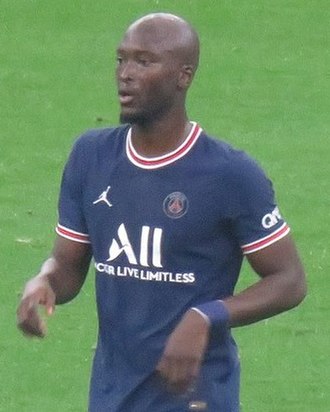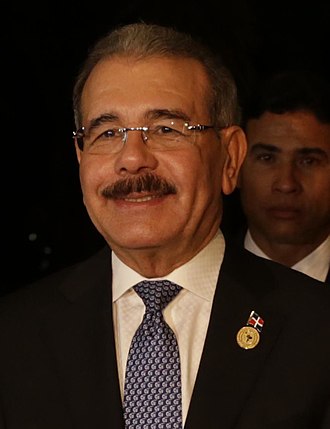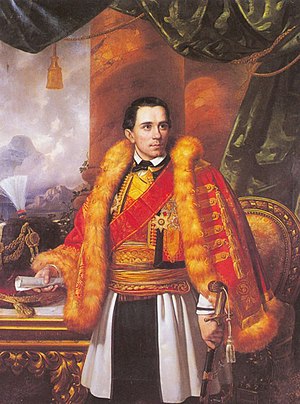Discover Your Roots
SIGN UPDiscover Your Roots
SIGN UPDanilo is a male name of Spanish origin, meaning "(Only) God Is My Judge." It is commonly found in Italian, Portuguese, Spanish, and Serbian cultures. The name reflects a deep religious significance, referring to the belief that ultimate judgment and justice come from a higher power. Notable individuals with the name Danilo span various fields, including sports, arts, politics, and religion. Athletes such as Brazilian footballers and Serbian basketball players, as well as prominent figures in the arts and entertainment industry, such as Italian writers and Serbian actors, have carried the name. Additionally, politicians, government officials, revolutionaries, and religious leaders have also been associated with the name Danilo. The name's historical and cultural significance is further exemplified by various notable figures, including Prince Danilo of Montenegro and Archbishop Danilo I of Serbia.

Danilo Luís Hélio Pereira, commonly known as Danilo, is a professional footballer currently playing for Saudi Pro League club Al-Ittihad. Born in Guinea-Bissau, he moved to Portugal at a young age and developed his football skills at Benfica's youth academy. After a brief stint at Italian Serie A side Parma, he joined Marítimo in 2013, where he made significant contributions before moving to Porto in 2015. During his time at Porto, he won two Primeira Liga titles and was named the club's footballer of the year. In 2020, he transferred to Paris Saint-Germain on loan, which was later made permanent, and then moved to Al-Ittihad in 2024. Pereira has represented Portugal at various youth levels and made his senior international debut in 2015. He was part of the squads that triumphed in UEFA Euro 2016 and the 2019 UEFA Nations League Finals. With his versatility as a defensive midfielder or centre-back, Pereira has made significant contributions to the clubs he has represented and continues to excel in his football career.

Danilo Medina Sánchez, born 10 November 1951, is a prominent Dominican politician who served as President of the Dominican Republic from 2012 to 2020. A member of the Dominican Liberation Party (PLD), Medina's political career began in the early 1990s, and he played key roles such as President of the Chamber of Deputies and Secretary of State of the Presidency. He is known for his strategic political acumen and negotiation skills, contributing significantly to the PLD's success. Medina's presidency was marked by a focus on humanitarian efforts, transparency, and goal-oriented governance, earning him a 65% approval rate by the end of his second term. However, his family has been embroiled in allegations of corruption during his presidency. Medina's early years saw him as a student leader and a dedicated member of the PLD, and he graduated magna cum laude in economics. Married to psychologist Cándida Montilla, he has three daughters. As of November 2020, investigations into corruption involving his family continue, with two of his brothers under arrest. Medina's impact on Dominican politics and his presidency have left a lasting legacy, shaping the country's political landscape.

Danilo I Petrović-Njegoš, also known as Danilo I, was the ruling Prince of Montenegro from 1851 to 1860. He played a significant role in the transition of Montenegro from a traditional theocratic form of government into a secular Principality. Danilo became involved in a war with the Ottoman Empire in 1852 and, with the help of his elder brother, Voivode Mirko, achieved important military successes, including the crucial Battle of Grahovac in 1858, which led to Montenegro's de facto independence and the official demarcation of borders with Turkey. Danilo also sought an alliance with Russia but faced challenges due to his Francophile attitude, which strained relations with Russia, Austria, and Serbia. Despite his efforts to secure Montenegro's sovereignty and territorial enlargement, Danilo encountered opposition and enemies within Montenegro. His reign marked a significant shift in Montenegrin history, and his ambition to upgrade Montenegro to a kingdom was left unrealized as he passed away before seeing it come to fruition. Danilo's contributions to Montenegro's independence and geopolitical positioning left a lasting impact on the nation's history.

Danilo Stefanović (8 May 1815 – December 2, 1886) was a prominent Serbian politician who served as the Prime Minister of Serbia. Born in Timișoara, Stefanović was highly educated, and his political career began in 1838 when he was appointed head of the Poreč-Reka district. Throughout his career, he held various positions of authority, culminating in his appointment as Prime Minister in February 1875. Stefanović's government faced challenges, including political altercations and the Herzegovina uprising. His tenure was also marked by police persecution and attempts to influence election outcomes. Despite these challenges, his government largely engaged in current affairs and avoided major political issues. Following his retirement from public duty in 1879, Stefanović left a lasting legacy in Serbian politics. His contributions and leadership during a tumultuous period in Serbian history have solidified his place in the country's political landscape.

Danilo Russo, born on July 8, 1987, is an Italian footballer renowned for his role as a goalkeeper for Serie C Group C club Giugliano. Russo's journey began at Genoa, where he honed his skills before embarking on loan spells to Pergocrema and Viareggio. His impressive performances during these stints led to his return to Genoa, where he served as the third-choice goalkeeper. Subsequently, he joined Vicenza, excelling in the Serie B and playing 29 games. His talent attracted the attention of Spezia, with whom he achieved significant success, winning the Supercoppa di Lega di Prima Divisione and Coppa Italia Lega Pro. Russo continued to make impactful career moves, including joining Pro Vercelli and Venezia. Notably, he played a pivotal role in Juve Stabia's promotion to Serie B and eventually signed a contract with Giugliano. Despite his club achievements, Russo also showcased his skills on the international stage, representing Italy at various youth levels. His remarkable journey is a testament to his dedication and talent in the world of football.
All images displayed on this page are sourced from Wikipedia or Wikimedia Commons.We use these images under their respective Creative Commons or public domain licenses. Wherever applicable, author attributions and license information are provided. If you believe an image is used incorrectly or outside its license terms, please contact us so that we can review and correct the issue.